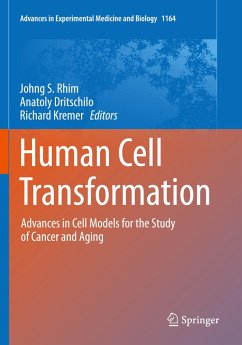Human Cell Transformation
Advances in Cell Models for the Study of Cancer and Aging
Herausgegeben:Rhim, Johng S.; Dritschilo, Anatoly; Kremer, Richard
Human Cell Transformation
Advances in Cell Models for the Study of Cancer and Aging
Herausgegeben:Rhim, Johng S.; Dritschilo, Anatoly; Kremer, Richard
- Broschiertes Buch
- Merkliste
- Auf die Merkliste
- Bewerten Bewerten
- Teilen
- Produkt teilen
- Produkterinnerung
- Produkterinnerung
This book, part contributed volume, part proceedings, discusses state-of-the-art advances on human cell transformation in cell models for the study of cancer and aging. Several of the chapters are from the Human Cell Transformation: Advances in Cell Models for the Study of Cancer and Aging conference that was held in June 2018 at McGill University. The authors represent international expertise on a wide variety of topics ranging from different types of cancer (prostate, bone, breast, etc.) to tumor microenvironment, tumor progression, homogeneity, and possible therapies and treatments.
Andere Kunden interessierten sich auch für
![Human Cell Transformation Human Cell Transformation]() Human Cell Transformation112,99 €
Human Cell Transformation112,99 €![Stem Cell Heterogeneity Stem Cell Heterogeneity]() Stem Cell Heterogeneity82,99 €
Stem Cell Heterogeneity82,99 €![Role of Autophagy and Reactive Oxygen Species in Cancer Treatment Role of Autophagy and Reactive Oxygen Species in Cancer Treatment]() Role of Autophagy and Reactive Oxygen Species in Cancer Treatment149,99 €
Role of Autophagy and Reactive Oxygen Species in Cancer Treatment149,99 €![Cellular Heterogeneity Cellular Heterogeneity]() Cellular Heterogeneity75,99 €
Cellular Heterogeneity75,99 €![Skin Stem Cells Skin Stem Cells]() Skin Stem Cells82,99 €
Skin Stem Cells82,99 €![Stem Cell Heterogeneity Stem Cell Heterogeneity]() Stem Cell Heterogeneity75,99 €
Stem Cell Heterogeneity75,99 €![Cellular Heterogeneity Cellular Heterogeneity]() Cellular Heterogeneity82,99 €
Cellular Heterogeneity82,99 €-
-
-
This book, part contributed volume, part proceedings, discusses state-of-the-art advances on human cell transformation in cell models for the study of cancer and aging. Several of the chapters are from the Human Cell Transformation: Advances in Cell Models for the Study of Cancer and Aging conference that was held in June 2018 at McGill University. The authors represent international expertise on a wide variety of topics ranging from different types of cancer (prostate, bone, breast, etc.) to tumor microenvironment, tumor progression, homogeneity, and possible therapies and treatments.
Produktdetails
- Produktdetails
- Advances in Experimental Medicine and Biology 1164
- Verlag: Springer / Springer International Publishing / Springer, Berlin
- Artikelnr. des Verlages: 978-3-030-22256-7
- 1st ed. 2019
- Seitenzahl: 260
- Erscheinungstermin: 17. Oktober 2020
- Englisch
- Abmessung: 254mm x 178mm x 15mm
- Gewicht: 496g
- ISBN-13: 9783030222567
- ISBN-10: 303022256X
- Artikelnr.: 60161934
- Herstellerkennzeichnung Die Herstellerinformationen sind derzeit nicht verfügbar.
- Advances in Experimental Medicine and Biology 1164
- Verlag: Springer / Springer International Publishing / Springer, Berlin
- Artikelnr. des Verlages: 978-3-030-22256-7
- 1st ed. 2019
- Seitenzahl: 260
- Erscheinungstermin: 17. Oktober 2020
- Englisch
- Abmessung: 254mm x 178mm x 15mm
- Gewicht: 496g
- ISBN-13: 9783030222567
- ISBN-10: 303022256X
- Artikelnr.: 60161934
- Herstellerkennzeichnung Die Herstellerinformationen sind derzeit nicht verfügbar.
Johng S. Rhim, MD Associate Director, Center for Prostate Disease Research (CPDR), Research Professor Emeritus, Department of Surgery and Uniformed Service University of the Health Sciences (USUHS). Dr. Rhim has served as an associate director, the CPDR and professor of surgery in the department of surgery at the USUHS, in Bethesda, MD, a state-of-art translational research program that studies prostate cancer and prostate disease in the military healthcare system. Working in this capacity since 1999, he has also been a research professor in the department of surgery since 2000. Dr. Rhim spent 12 years as a project director of cancer research at Microbiological Associates, and 20 years as a senior investigator for the National Cancer Institute, both located in Bethesda, MD. He is an internationally recognized pioneer in the field of human cell transformation and his success in the development of cell culture systems has opened this field to the analysis of cellular, molecular and genetic mechanism of actions of chemical carcinogens, oncogenes and radiation. Earning an MD at Seoul National University College of Medicine in Korea in 1957, Dr. Rhim came to the United States in 1958. He quickly began serving a research fellow at Dr. Albert B. Sabin's laboratory, the Children's Hospital Research Foundation in Cincinnati, OH, then worked in the same capacity at Baylor University College of Medicine in Huston, TX, for another two years. A research associate for the Graduate School of Public Health at the University of Pittsburg and at Louisiana State University School of Medicine thereafter, he subsequently spent two years as a visiting scientist at the National Institute of Allergy and Infectious Disease, from 1964 to 1966. Dr. Rhim has also been a longtime adjunctive professor at Georgetown University Medical Center in Washington, DC, since 1988. He has also served as an editor for " Neoplastic Transformation in Human Cell Cultures" numerous timessince 1991 and has contributed more than 320 articles, book chapters, and patented work to his field. He has been cited in numerous issues of Who's Who in America, Who's Who in Medicine and Healthcare and Who's who in Science and Engineering since 1999. In recognition of outstanding contributions to his profession and the Marquis Who's Who community, Dr. Rhim has been featured on the Albert Nelson Marquis Lifetime Achievement in 2018. Anatoly Dritschilo, M.D., is Professor and Chairman of the Department of Radiation Medicine (Georgetown University Medical Center) and Chief to Radiation Oncology service at the MedStar-Georgetown University Hospital. Dr. Dritschilo holds a BS degree in Chemical Engineering from the University of Pennsylvania, a MS degree from the New Jersey College of Engineering, earned his medical degree from the College of Medicine of New Jersey and completed his residency and fellowship at the Harvard, Joint Center for Radiation Therapy. He has held leadership positions at Georgetown University, including Medical Director of Georgetown University Hospital from 1994 to 1997 and Interim Director of the Lombardi Comprehensive Cancer Center from 2005 to 2007. Dr. Dritschilo's research includes basic science (laboratory) studies of radiation carcinogenesis in human cells, investigations of molecular mechanisms of cancer resistance to radiation therapy and discovery of radiation sensitizing drugs to increase cures of patients treated for cancers with radiation therapy. He has performed clinical trials of radiation sensitizers and has discovered new drugs for cancer treatment in combination with radiation therapy. He has more than 250 scientific publications, is a Fellow of the American College of Radiology and an elected Fellow of the National Academy of Inventors. Dr. Richard Kremer is currently Professor and Director of the Bone and Mineral Unit in the Departmentof Medicine of McGill University and McGill University Health Centre. He is also the Academic Director of the Division of Medical Biochemistry at McGill University. Dr Kremer's laboratory has focused on the role of calcium regulating hormones in health and disease. His laboratory aims to elucidate the role of 1, 25-dihydroxyvitamin D, the active form of vitamin D, and of parathyroid hormone related protein (PTHrP) in tumor initiation, growth and metastasis.
Mechanisms underlying metastatic pancreatic cancer.- Current Perspectives on Nasopharyngeal Carcinoma.- An in Vitro Model of Triple Negative Breast cancer.- Emerging role of novel biomarkers of Ly6 gene family in pan cancer.- The Oncoprotein Gankyrin/PSMD10 as a Target of Cancer Therapy.- Contributing roles of CYP2E1 and other cytochrome P450 isoforms in alcohol-related carcinogenesis.- Novel Human Prostate Epithelial Cell Cultures.- African American Prostate Normal and Cancer Cells for Health Disparities Research.- Assessing the Advantages, Limitations and Potential of Human Primary Prostate Epithelial Cells as a Pre-Clinical Model for Prostate Cancer Research.- Role of alternative splicing in prostate cancer aggressiveness and drug resistance in African Americans.- Research Article: Discovery of Metabolic Biomarkers Predicting Radiation Therapy Late Effects in Prostate Cancer Patients.- The Aging Skeleton.- Parathyroid Hormone Related Protein (PTHrP): an Emerging Target in Cancer Progression and Metastasis.- Targeting DNA hypomethylation in malignancy by epigenetic therapies.- Tumor Dormancy and Slow-Cycling Cancer Cells.- Resolution of Cellular Heterogeneity in Human Prostate Cancers: Implications for Diagnosis and Treatment.- Small molecule inhibition of glycogen synthase-kinase 3 in cancer immunotherapy.
Mechanisms underlying metastatic pancreatic cancer.- Current Perspectives on Nasopharyngeal Carcinoma.- An in Vitro Model of Triple Negative Breast cancer.- Emerging role of novel biomarkers of Ly6 gene family in pan cancer.- The Oncoprotein Gankyrin/PSMD10 as a Target of Cancer Therapy.- Contributing roles of CYP2E1 and other cytochrome P450 isoforms in alcohol-related carcinogenesis.- Novel Human Prostate Epithelial Cell Cultures.- African American Prostate Normal and Cancer Cells for Health Disparities Research.- Assessing the Advantages, Limitations and Potential of Human Primary Prostate Epithelial Cells as a Pre-Clinical Model for Prostate Cancer Research.- Role of alternative splicing in prostate cancer aggressiveness and drug resistance in African Americans.- Research Article: Discovery of Metabolic Biomarkers Predicting Radiation Therapy Late Effects in Prostate Cancer Patients.- The Aging Skeleton.- Parathyroid Hormone Related Protein (PTHrP): an Emerging Target in Cancer Progression and Metastasis.- Targeting DNA hypomethylation in malignancy by epigenetic therapies.- Tumor Dormancy and Slow-Cycling Cancer Cells.- Resolution of Cellular Heterogeneity in Human Prostate Cancers: Implications for Diagnosis and Treatment.- Small molecule inhibition of glycogen synthase-kinase 3 in cancer immunotherapy.








